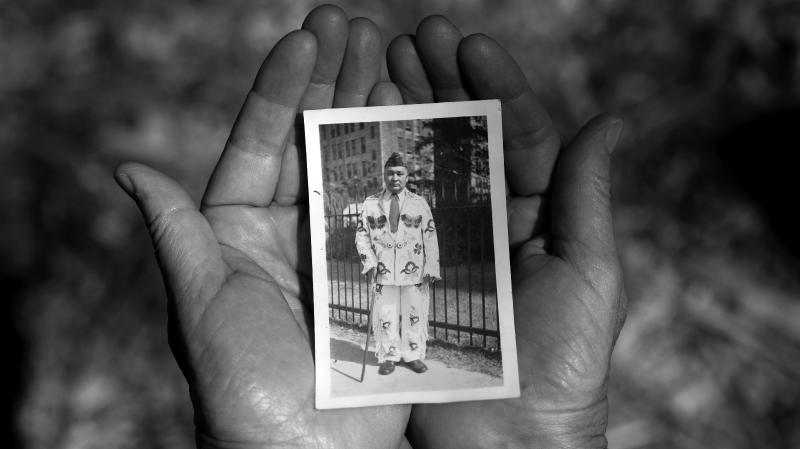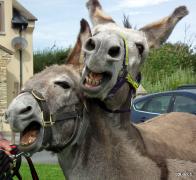Family heirlooms central to Indigenous photographer's reflections on identity : The Picture Show : NPR
By: NPR. org



December 25, 202111:13 AM ET
Na MacKnight
Elizabeth Gillis
Photographer Na MacKnight never met her great grandfather John B. McGillis, but she did have a window into his storied life as an Anishinaabe man in early 20th-century America: a steam trunk where he stowed away undated photographs and stray objects such as an address book, a pair of horn-rimmed glasses, and a single eagle feather. McGillis lived through decades of oppressive actions against native peoples by the U.S. government, and MacKnight says that in a world where he couldn't fully be himself most days, this collection reveals how her great grandfather worked to reclaim his identity.
The steamer trunk contained a 1916 edition of the "Tributes to A Vanishing Race" by Native American authors Irene Beaulieu and Kathleen Woodward and consists of poetry and prose related to Native American history and literature. The photograph of John B. McGillis was taken in his elder years in Los Angeles, California.
"I was filled with joy to be able to hold his personal items," MacKnight writes in a Q&A with NPR. "I was also haunted by the fact that the only photographs that he left behind marked a time of trauma and violence that Native Americans faced due to assimilation policies."
Like many Indigenous people his age, McGillis was forced to attend federal boarding school for Native American children. He also fought in WWI and later secured a position at the U.S. Bureau of Indian Affairs where he worked towards improving employment opportunities for Indigenous people. MacKnight's family recounts a man who spoke his tribal language in the company of friends and relatives, while learning the language of the white dominant culture to expand opportunities for his people in his professional roles.
Various contents in the trunk such as a newspaper, a handwritten letter and a U.S. army cap illustrate his experiences in France while he was serving in WWI. The photograph of John B. McGillis was reportedly taken after the war, in an unknown location. While in uniform, he shows off his artifacts collected from war.
Using her skills as a documentary photographer and interviews with relatives and family friends, MacKnight is piecing together McGillis' history and reflecting on questions of identity and self-determination that persist to this day. She shared some insight into her process with NPR.
What story do you hope these photographs tell?
It is my hope that my Great Grandfather's story will invite viewers to expand their perceptions of Indigeneity, and further acknowledge the diverse contributions of Native Americans within the framework of American history. Contrary to dominant Eurocentric narratives, Indigeneity did not vanish when the United States was founded. Instead, folks like my Great Grandfather applied their Indigenous knowledge in a new way to carve out spaces for his people. His story ultimately conveys the creative tactics used by our ancestors for survival, and the fight for self-determination that Indigenous people still face today.
How do you decide which objects to photograph and how to construct each photograph?
Initially, I sifted through the hundreds of photographs in this trunk to piece together the different chapters in his life. As I began interacting with the images, I noticed the photographs that he left behind conveyed his life post-boarding schools. I discovered letters and diary entries that expressed the obstacles he faced as a Native American man navigating a rapidly shifting world in the early 1900s.
I felt that the intensity of the modernization of the times and the use of natural textural elements in the background conveyed the duality of my Great Grandfather's experience. It was also important for me to photograph this project in the South Bay region of Los Angeles, also known as Tongva Territory, where my Great Grandfather spent his last days before transitioning to the spirit world.
McGillis was born in present-day Minnesota and spent his early years immersed in ancestral Anishinaabe customs and language. He attended a boarding school like many other Native American children due to the federal push for assimilation. While at the Haskell Institute, he wrote for the newspaper, played football and created life-long friendships with other scholars and athletes such as Jim Thorpe.
An excerpt from a journal entry that was found in John B. McGillis's address book conveyed his process for enlisting in WWI. He first applied for enlistment with the U.S. Marines but was denied on the ground that he was Native American and did not have U.S. citizenship. He was later called for military service in WWI, and was appointed Captain of the Mahnomen Contingent.
Would you say this has been a personal project for you and in what way?
This project started out as an inquiry into my relative's life, and evolved into experiences of deep inward reflection and healing. I was confronted with the violence and trauma that my Great Grandfather experienced at the time as an Anishinaabe man forced to leave his ancestral homelands due to federal assimilation policies. However, the contents of his trunk that he left behind embody a spirit of resistance through images of growth, change and joy. His efforts to reclaim his identity through the trauma that he endured is inspirational, and serves as a reminder of the importance of sovereignty through storytelling.
Tell me a little about one or two things that have surprised you since you started this process?
In order to further understand the impact that my Great Grandfather left on his relatives, I reached out to multiple relatives about their memories of him. I was surprised to find out aspects of his personality through various family stories that are not conveyed in the contents that he left behind in the trunk. One relative reported that his exceptional hunting skills were what helped the family get through the Great Depression.
Another relative described him as a deeply loving man who loved being in the company of his family. I was also surprised at the creative ways that my relatives connected, despite our geographic distance, to share stories about my Great Grandfather John B. McGillis. This project demonstrates the power of intergenerational storytelling, and the ability of our ancestors to transcend place and time.
Special thanks to Kevin Locke, Sheridan MacKnight, Winona Flying Earth, and Thelbert Milligan for contributing their knowledge about the life of John B. McGillis to this project.
See more of MacKnight's photography on Instagram @nia.macknight.






Trolling, taunting, and off-topic comments may be removed at the discretion of group mods. NT members that vote up their own comments or continue to disrupt the conversation risk having all of their comments deleted. please remember to quote the person(s) to whom you are replying to preserve the continuity of this seed.
Click on ''Seeded Content'' to view the many interesting photos.
I found this written note by McGillis to be the order of the day when it came to Native American's.
Not a citizen in our own land. Think about that.
this is one of many reasons why our nation's children deserve to know the entire history of america, not just the white washed generic version that those whose forefathers instituted this type of systemic racism would rather be forgotten as time progresses.
To some, it's better to hide the truth than face it.
That has to got be one of the dumbest things this country has ever done and this country has done a lot of dumb things. How can say he's not a citizen when he was born here and governed by the very laws they set down for him to follow?
It also seems that eventually, the government was perfectly willing to have him fight for a nation that would not recognize him as a citizen. Shameful.
They needed the warm bodies. Like I said our country has done a lot of dumb things. Using people and not rewarding them is just one of those
My father was born in 1915 and my mother in 1916 neither were citizens until 1924 when the law was passed making NA citizens.
Both my grandfather and grandmother refused to accept US citizenship since they felt, rightly so that if they were not citizens of the country that they and our people had lived in for thousands of years why bother with it now.
I never knew that NA's didn't become citizens until 1924. One of the many ugly truths never taught in school
Sadly, it's one of the many truths that are never taught in school
I didn't know until I "met" Kavika here on NT.
Our public school system's history classes are far too forgiving of our past.
Citizenship was one thing, voting was a whole different matter.
I was thinking that when I read 1.2.3.
I have learned a lot from Kavika.
Thanks Veronica.
Interesting article and a fascinating way to look at personal history. The photo of the children looking through the chest was very sweet.
I found that photo to be especially poignant.
The pictures in the article are interesting to say the least. As I looked at them I found myself thinking of stories to go with them.
Exactly, I did the same, Veronica.
Looking at them also got me to thinking about some film my daughter had developed for me for Christmas. Pictures from a long long time ago. My son was soooo little & cute.
Here is a good article the battle NA's have fought to exercise our right to vote.
I never knew about this, since although my father's family has been here during the Civil War, the paternal part of the family was Austrian, while the maternal part was Indian. My great great granddad, was Austrian and fought in the war. Since this was back when the US government looked at the male side of the family, everyone could fight. But it is odd for me to think of my great-grandmother as not being considered American and no different from my Grandmother who was from Odessa, Russia.
What a slap in the face to my great grandma's family.
Indeed it was and a huge slap in the face to all Natives.